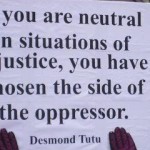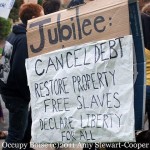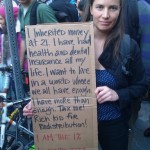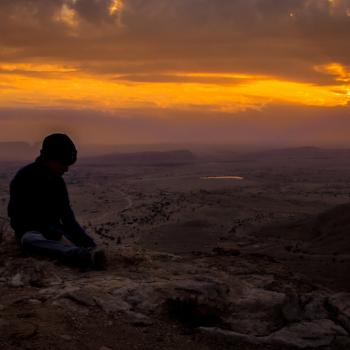After weeks with a notable lack of media coverage about it, American Christians are learning about an amazing phenomenon that is taking place on Wall Street in New York that has birthed a movement that’s spreading across the land. Hundreds of thousands of our fellow citizens are showing up en mass to parks and city squares to protest corporate fraud and exploitation and to express their outrage. But what should Christians make of all of this? We like “lists of 10” so I’d like to offer the following action items for us to consider:
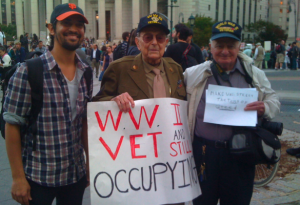 1. Try to understand what’s going on.
1. Try to understand what’s going on.
In order to decide if these protests are a bunch of “angry anarchists and hippies who want to burn bras and smoke pot;” a passing, inconsequential fad; or if they are the sincere actions of a growing group of deeply patriotic and highly diverse fellow citizens from across the country who are proving to be a serious force to be reckoned with – depends upon how familiar we are with what is actually taking place and why.
Here are some links that can help you get up to speed on what is motivating these protesters and what’s been taking place over the past few weeks:
This isn’t a Joke! (news story)
“Economy Held Hostage to Defeat Obama”
Independent U.S. Senator, Bernie Sanders, summarizes things well when he stated, “The financial crisis and the jobs crisis have demonstrated to the American people that we now have a government that is of the 1 percent, by the 1 percent and for the 1 percent, as Nobel Prize winning economist Joseph Stiglitz eloquently articulated. The rest of the 99 percent are, more or less, on their own. We now have the most unequal distribution of wealth and income of any major, advanced country on earth. The top one percent earn more income than the bottom 50 percent and the richest 400 Americans own more wealth than the bottom 150 million Americans.”
2. Identify Points of Agreement
It would be difficult for any Christian to bless the increasingly unjust status quo. Put me on record as saying, “impossible.” And it would clearly be unfair and wrong to dismiss all of the protesters as “naïve hippies.” At our best, Christian values have historically embraced the Biblical values of egalitarianism; social justice; prophetically speaking truth to power; and championing the cause of the poor, the exploited, and the oppressed.
3. Place the Occupation into Larger Contexts,
including global, historical, biblical, and within the context of Christian tradition. Our domestic occupations have arisen within months of the “Arab Spring” where massive sectors of the populations of several middle eastern nations rose up seeking increased rights, liberties, and democracy. It is an historical fact that revolts and uprisings tend to be contagious across the globe over the years. It is no accident that the French and American revolutions happened within months of each other. It’s a curious irony that we’re being reminded of our historical commitments to freedom and non-elitist democracy by people living under highly repressive regimes overseas.
We would also do well to ponder associations with the exodus of the ancient Hebrews with Moses telling the oppressive Pharaoh “God says, ‘Let my people go!’ ” as well as the early covenant God made with his people – a covenant that included prohibitions against usury (charging excessively high interest rates); commands to provide for the poor; a regular and intentionally ongoing “Year of Jubilee” designed to release people from their debts (and indentured servitude to their debtors) and to restore properties to their original owners, etc.
At the end of every seven years you shall grant a remission of debts. This is the manner of remission: every creditor shall release what he has loaned to his neighbor; he shall not exact it of his neighbor and his brother, because the LORD’S remission has been proclaimed. — Deuteronomy 15:1-2
Lest anyone think that “Christians shouldn’t get upset, express anger, or protest,” we need to remember the ruckus Jesus made one day in Jerusalem where he knocked over the tables of the money lenders and chased them out of the Temple courtyard with a bullwhip spinning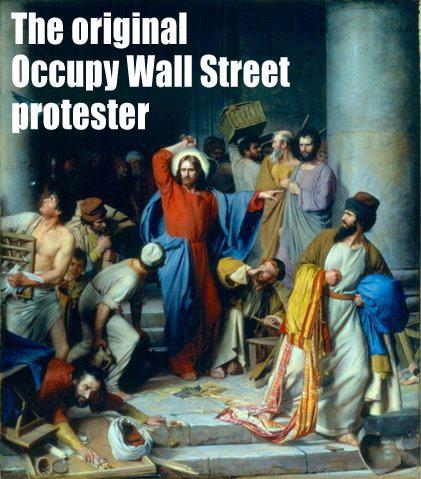 over his head (note: he didn’t actually hit anyone with it).
over his head (note: he didn’t actually hit anyone with it).
We should also be prepared for “the Empire to strike back.” Though Jesus showed that the worldly powers-that-be are ultimately impotent, they do tend to sting. Sacrifice should not be a surprise (but pepper spraying harmless girls who are penned up? Really NY cops?).
We should also ponder associations with the Civil Rights Movement of the 1950s and ‘60s. One strategy that comes to mind is to employ what they did in Birmingham, Alabama – flooding the jails. If we can provide an endless sea of protesters, they won’t be able to tend to us in the jails – and we’ll render jailing us with a revolving door – costly, moot, and ridiculous.
We’d also do well to heed the words of wisdom from veterans of those movements such as Jim Wallis – especially his reminder of how essential nonviolence is to effective protest.
4. Show compassion
to as many of the people caught up in this mess (all of us) as possible. Strive to love our enemies as Jesus taught. When we confront CEOs, bankers, politicians, pundits, police, or the media, let’s remember their humanity. They go home to families and pets that love them and they have wounds in their hearts that we’ll never know. The same goes for those who are protesting. Many of them have been out of work for months or years and the youngest of them are understandably upset to realize the likely bleakness of their futures with the possibility of little or no Social Security ahead.
A particularly Christian thing to do might be for Church people to show up to the protests and serve water, coffee, and baked cookies to the protesters, the police, and the businesspeople walking by. It’s hard to be aggressive toward someone who is drinking hot cocoa and eating cookies with you.
That said, when he taught his followers how to love their enemies Jesus instructed them to not be doormats, but to employ tough love – even to the point of flipping the power dynamics and making the oppressors be publicly embarrassed. Roman soldiers sometimes forced hapless Hebrew peasants to carry their packs. The military code of conduct stated that they couldn’t have a given peasant carry it more than 1 mile however. So, Jesus told them, should that happen to them, keep on going past the 1 mile marker and carry his pack a 2nd mile. The dismayed soldier would be forced to chase after the peasant and plead with them to stop carrying it as otherwise the solider would be punished by his superiors!
Similarly, Jesus told his followers that if someone they owe money to approaches them demanding payment, and if you don’t have the cash, and if they ask for your coat as payment, go on and take off the rest of your clothes too and give them as well In that culture, the shame isn’t on a naked person, but on people who look at them, so this would force the person who you’re indebted to flee asap (sort of like how frogs pee on themselves when being attacked, makes them not such a savory meal to would be predators).
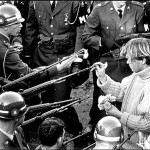 And finally, Jesus told this disciples that if a Roman or Hebrew superior strikes you on the right cheek (with the back of their right hand), you should go ahead and turn your left cheek to them too, as this would force them to not backhand you as a superior would do, but to instead treat you as an equal, as a peer – as someone they’d have to outright punch — thus taking away the hierarchical power imbalance. The oppressor would either have to hit you and concede that you’re his equal or walk away with his tail between his legs. Either way, you win.
And finally, Jesus told this disciples that if a Roman or Hebrew superior strikes you on the right cheek (with the back of their right hand), you should go ahead and turn your left cheek to them too, as this would force them to not backhand you as a superior would do, but to instead treat you as an equal, as a peer – as someone they’d have to outright punch — thus taking away the hierarchical power imbalance. The oppressor would either have to hit you and concede that you’re his equal or walk away with his tail between his legs. Either way, you win.
One way to apply these teachings to today’s confrontation with corporate greed might be, “If someone demands payment on your mortgage or debt, give them your ROTH IRA too.” Or, send your child into the lobby of their business with their payment in full – in pennies, in a wheelbarrow – showing that their demand is hurting a real live family – and be sure to video record it and post it onto YouTube.
5. “Forgive us our debts as we forgive our debtors against us.” In other words, engage in Confession.
The fact is that we’re all caught up in this nasty mess where we owe some people and others owe us. Sure, some of us are more “victim” than others, but most all of us have some degree of complicity in our own predicaments. We spend beyond our means. We use credit cards when we shouldn’t. We may agree to loan terms that we know we can’t live up to. And… we may have people sign loans whose terms we know they can’t satisfy.
Some of us have pension plans or investments that benefit from the exploitation of others. Yeah, that’s kind of a big deal. Might be time to consider transferring investments to ones that are more socially conscious and just.
Oh, and if you don’t have stocks to transfer, if you drink coffee or cocoa that isn’t “fair trade certified” or wear most brands of sports shoes or clothing, you participate in oppressive systems that exploit others.
It’s too easy to paint them as “the bad guys” and us as the “good guys.” Don’t take the easy way – it never works. Jesus said that “his way is narrow.” Try following it anyway.
6. Spiritualize it.
It may seem that this is simply a “political” or an “economic” matter, but ultimately, the matters at hand are spiritual ones. We need to ponder what our true “gods” are and where our commitments truly are.
We might want to consider how the Occupy movement is akin to a “Great Awakening.” Revival happens and God’s Holy Spirit is still afoot and at work in the world. Consider “how might God be at work in our midst?”
7. Critique it.
Here’s an example. I get it. Corporate greed needs to be challenged and corporations need to be taxed and regulated. The gap between the haves and the have-nots in the U.S. needs to be reduced. The Bush tax cuts for the wealthy need to be repealed. Student loans need to be forgiven. Banks that were bailed out by the taxpayers shouldn’t keep on screwing their customers over. And the USSC ruling that decreed that corporations are persons and can thus buy off our politicians and get them to do their bidding needs to be rescinded.
I agree with all of those aims of the “Occupy Wall Street” protesters. But even if all of those sensible demands somehow come to pass (including the many other ones that I didn’t mention), in the big picture it may not be all that meaningful. Much ado about nothing.
You see, if all of those reforms were to happen, it would effectively put things back to the way things were 15-20 years ago. Though it would mean resuming our upwardly mobile middle class and reducing the gap between the wealthy and the poor, it would simply allow us to blindly press on with pursuing “the American Dream” where each generation does better than the one before it. And it would allow us to obliviously maintain the unjust global status quo where 5% of the world’s population (the U.S.) consumes nearly 1/3 of the world’s natural resources and disproportionally spews out more trash and pollution than the other nations do.
It would mean returning to a situation where the U.S. gives only a paltry 1/10th of 1% of our GDP to humanitarian aid to other countries. We could cut hunger in Africa in half in 15 years if we were to tax every American 1 penny per day. But we don’t and apparently aren’t about to. No one is protesting or occupying on behalf of the many millions of people in the world who are actually being screwed over the most. To the extent that the Occupy movement is nationalist, myopic, and insular, it’s merely rearranging the deck chairs on an economically segregated and unsustainable Titanic.
8. Join the Occupy Movement.
Show up at a protest near you, or find other ways to be in solidarity with them. Either as part of the 99% or as part of the 1%.
Clergy may wish to participate in this way or as a “Protest Chaplain.”
“We are the 1%, we stand with the 99%” — here’s another remarkable organization, Resource Generation, that’s been around since 1998 helping wealthy young people contribute toward social change. Now, they are the 1%, standing with the 99%. “We organize to transform philanthropy, policy, and institutions, and leverage our collective power to make lasting structural change. We influence how foundations work, affect progressive tax policy and work to decrease wealth inequality. It’s our turn! Young people have been and will always be on the forefront of social change.”
9. Ponder these words from one of our contemporary prophets/court jesters:
“If this is going to be a Christian nation that doesn’t help the poor, either we have to pretend that Jesus was just as selfish as we are, or we’ve got to acknowledge that He commanded us to love the poor and serve the needy without condition and then admit that we just don’t want to do it.” ― Stephen Colbert
10. “Buy a plot of land.”
I bought the field at Anathoth from my cousin Hanamel and weighed out for him seventeen shekels of silver. I signed and sealed the deed, had it witnessed, and weighed out the silver on the scales. I took the deed of purchase—the sealed copy containing the terms and conditions, as well as the unsealed copy— and I gave this deed to Baruch son of Neriah, the son of Mahseiah, in the presence of my cousin Hanamel and of the witnesses who had signed the deed and of all the Jews sitting in the courtyard of the guard. “In their presence I gave Baruch these instructions: ‘This is what the LORD Almighty, the God of Israel, says: Take these documents, both the sealed and unsealed copies of the deed of purchase, and put them in a clay jar so they will last a long time. For this is what the LORD Almighty, the God of Israel, says: Houses, fields and vineyards will again be bought in this land.’ – Jeremiah 32:9-15
When ancient Judah was under siege and about to be taken over by the Babylonians, the prophet Jeremiah did something radical. He did something that flew in the face of common sense and defied prudent business practice. As his nation was being over-run and decimated, he went out and bought a field! He demonstrated absurd faith in God and in the future of his country by investing in Judah when the wisdom of the world would’ve suggested to sell, abandon ship, and flee. Jeremiah’s bold actions demonstrated hope that God would ensure that a faithful remnant would survive the dark days ahead and that they would continue to be his people and that he would continue to be their God, who assures that “Houses, fields and vineyards will again be bought in this land.’”
Metaphorically, our nation is under siege – from within. My prayer for us is not for our economy or for a return to a time when our middle class was more stable and upwardly mobile. I pray not for a return to a time when many of us strove to increase our incomes and keep up with the Jones’ assuming that wealth is a sign of God’s favor, and that it trickles down to us as the rich get richer.
Instead, I pray for us to step back and see the bigger picture – through the eyes of faith. I pray for us to do some soul searching, and to reconsider our true priorities, commitments, and goals. I pray for us to remember who and Whose we are, and to play well in the global sandbox. I pray for us to truly follow the one whom many of us claim to follow and to not try to serve two masters. It’s hard to serve mammon and God — besides, it’s counter productive, conflicted, and leads to jealousies, insomnia, ulcers, and headaches.
I’m not calling for us all become Amish, join communes, or abandon our electronic toys or sports clothes. But I do pray for us to remember that much of that stuff is made by workers who are exploited in sweatshops around the world. I pray for us to be grateful for what we have and to trust that God will provide for our needs, though perhaps not our wants, day to day — and to remember that “it’s a gift to be simple.”
My intention in writing this message is to metaphorically “purchase a field” during an unlikely time. My hope is to provide a witness and reminder that God will ensure that a faithful remnant will survive and that the future is bright and beautiful. But I’m not particularly interested in purchasing a literal parcel of land or inspiring a remnant that is only concerned about “the resumption of the buying and selling of properties once again.” I’m interested in metaphorically purchasing a parcel of spiritual cahones, a field of faith, a plot of authentic Christianity.
I’m seeking fellow investors – occupiers of those fields.
In solidarity, and in Christ,
Roger Wolsey
Roger is an ordained United Methodist pastor and the author of the new book – Kissing Fish: christianity for people who don’t like christianity. He is also an active member of The Christian Left’s Facebook page.

